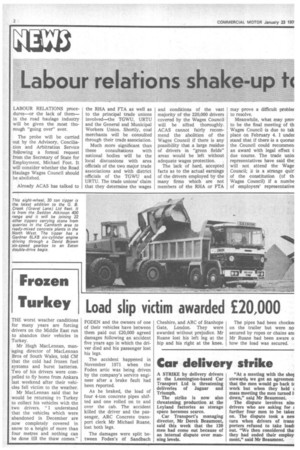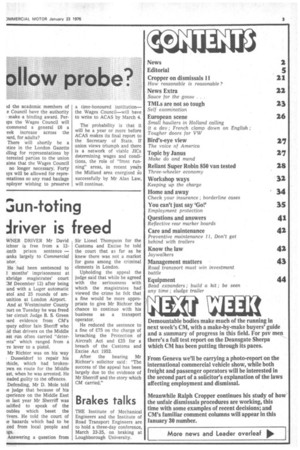Labour relations shake-up tc
Page 4

Page 5

If you've noticed an error in this article please click here to report it so we can fix it.
LABOUR RELATIONS procedures—or the lack of them— in the road haulage industry will be given the most thorough "going over" ever.
The probe will be carried out by the Advisory, Conciliation and Arbitration Service following a formal request from the Secretary of State for Employment, Michael Foot. It will consider whether the Road Haulage Wages Council should be abolished.
Already ACAS has talked to the RHA and FTA as well as to the principal trade unions involved—the TGWU, URTU and the General and Municipal Workers Union. Shortly, coal merchants will be consulted through their trade association.
Much more significant than these consultations with national bodies will be the local discussions with area officials of the two major trade associations and with district officials of the TGWU and URTU. The trade unions' claim that they determine the wages and conditions of the vast majority of the 220,000 drivers covered by the Wages Council will be sifted thoroughly. ACAS cannot fairly recommend the abolition of the Wages Council if there is any possibility that a large residue of drivers in "green fields" areas would be left without adequate wages protection.
The lack of hard, accepted facts as to the actual earnings of the drivers employed by the many firms which are not members of the RHA or FTA may prove a difficult probler to resolve.
Meanwhile, what may prov to be the final meeting of th Wages Council is due to tak place on February 4. I under stand that if there is a quorur the Council could recommen an award with legal effect 1 due course. The trade unia representatives have said the: will not attend the Wage Council; it is a strange quit.] of the constitution (of th Wages Council) if a numbe of employers' representative Id the academic members of e Council have the authority make a binding award. Perrps the Wages Council will commend a general £6 a eek increase across the Yard, for adults?
There will shortly be a )tice in the London Gazette Ming for representations by terested parties to the union aims that the Wages Council no longer necessary. Forty tys will be allowed for repremtations so any road haulage nployer wishing to preserve a time-honoured institution— the Wages Council—will have to write to ACAS by March 4.
The probability is that it will be a year or more before ACAS makes its final report to the Secretary of State. If union views triumph and there is a network of viable JICs determining wages and conditions, the role of "front running" areas, in recent years the Midland area energised so successfully by Mr Alan Law, will continue.
















































































